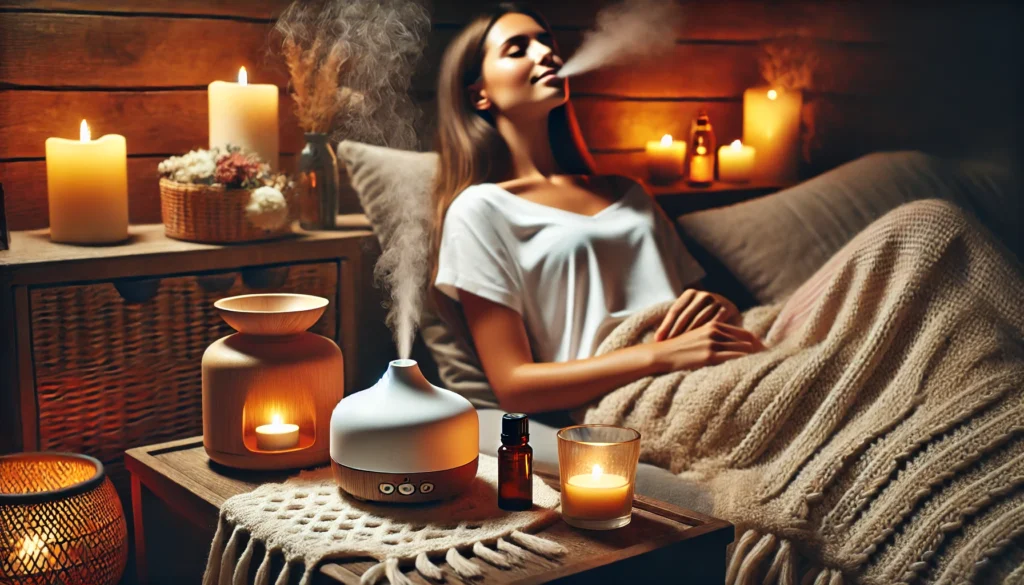Anxiety is a pervasive issue in today’s fast-paced world, and while medication is often prescribed, many individuals seek nonpharmacologic treatment for anxiety to avoid potential side effects or dependency. The quest for how to control anxiety without medication is both ancient and modern, as people have turned to holistic practices for centuries. This article delves into various approaches to overcoming severe anxiety without medication, providing a comprehensive overview for those seeking non-drug treatments for anxiety disorders.
You may also like: Stress Relief: Sentences to Calm Your Mind
Understanding Anxiety: A Modern Epidemic
Anxiety is more than just occasional worry or fear. It encompasses a range of disorders, including generalized anxiety disorder (GAD), social anxiety, and panic attacks. These conditions can significantly impact daily life, making non-pharmaceutical anxiety treatment a crucial area of interest.
The Historical Perspective
Historically, anxiety was often understood as a part of the human condition, with treatments ranging from herbal remedies to spiritual practices. Ancient civilizations like the Greeks and Egyptians utilized plants like valerian and chamomile for their calming effects. These traditional methods laid the groundwork for modern non-drug treatment for anxiety.
Ancient Wisdom
In ancient societies, anxiety was seen as a spiritual imbalance. Healers often used rituals and herbal concoctions to restore harmony. Practices like meditation and yoga, which originated in ancient India, were developed as means to cultivate mental peace and resilience against stressors.
Herbal Remedies
Many cultures turned to the earth for solutions, using plants and herbs to soothe the mind. Valerian root and passionflower were among the herbs used for their sedative properties. These natural remedies continue to be popular today, often as supplements or teas.
Spiritual and Ritualistic Practices
Spiritual practices played a significant role in anxiety relief. Rituals, prayers, and offerings were common methods to appease the mind. These practices were not just about spirituality but also offered a structured routine that could bring comfort and stability.
Modern Understanding of Anxiety
In the contemporary world, anxiety is recognized as a complex interplay of genetics, environment, and psychology. This understanding has led to the development of various therapies and interventions that target different aspects of anxiety disorders.
Psychological Insights
Modern psychology has provided deep insights into anxiety as a result of cognitive distortions and maladaptive thinking patterns. This has paved the way for therapies that specifically address these issues, providing individuals with tools to manage their thoughts and emotions.
Biological Factors
Research has also highlighted the role of neurotransmitters and hormones in anxiety. The balance of chemicals like serotonin and cortisol can influence mood and stress levels. This biological understanding supports interventions that aim to naturally balance these chemicals through lifestyle changes.
Societal Influences
Today’s fast-paced and high-pressure society contributes significantly to anxiety levels. The constant connectivity and information overload make it challenging to find peace. Recognizing these societal pressures is crucial in developing strategies to mitigate their impact.

Non-Pharmacological Interventions
Today, non-drug treatments for anxiety disorders are diverse and widely researched. Here are some effective strategies:
Mindfulness and Meditation
Mindfulness and meditation have gained popularity as powerful tools for managing anxiety. These practices help individuals focus on the present moment, reducing the rumination that often exacerbates anxiety symptoms. Studies have shown that mindfulness meditation can significantly decrease anxiety levels and improve overall well-being.
Techniques and Practices
Mindfulness involves a variety of techniques such as mindful breathing, body scans, and mindful eating. These practices encourage individuals to engage fully with the present moment, fostering a sense of calm and reducing anxiety.
Benefits and Research
Research has consistently shown that regular mindfulness practice can lead to significant reductions in anxiety and stress. Studies suggest that it can also enhance emotional regulation and increase resilience to stress.
Incorporating Mindfulness into Daily Life
Integrating mindfulness into daily routines can be simple. Starting with just a few minutes a day and gradually increasing the duration can be effective. Mindfulness apps and guided meditations are excellent tools for beginners.
Cognitive-Behavioral Therapy (CBT)
CBT is a well-established, evidence-based approach to treating anxiety. It involves identifying and challenging negative thought patterns and behaviors, helping individuals develop healthier coping mechanisms. CBT can be done individually or in group settings and is a cornerstone of anxiety non-medication treatments.
The Structure of CBT
CBT is structured and goal-oriented, usually conducted over a series of sessions. It involves homework assignments and exercises designed to challenge and change unhelpful thinking patterns.
Techniques Used in CBT
Key techniques include cognitive restructuring, exposure therapy, and skills training. These methods aim to replace negative thoughts with positive ones and teach coping strategies for anxiety-provoking situations.
Effectiveness and Accessibility
CBT has a strong evidence base supporting its effectiveness for various anxiety disorders. It is widely accessible, with many therapists offering in-person or online sessions, making it a viable option for many.
Physical Activity
Regular physical activity is not only beneficial for physical health but also plays a vital role in managing anxiety. Exercise releases endorphins, which are natural mood lifters. Activities such as yoga, tai chi, and even walking can be particularly effective in reducing anxiety symptoms.
Types of Exercise
Different forms of exercise have unique benefits for anxiety. Aerobic exercises like running or swimming can reduce tension, while yoga and tai chi incorporate mindfulness, adding a meditative element to physical activity.
The Science Behind Exercise and Anxiety
Exercise increases the production of endorphins and other neurotransmitters that improve mood. It also reduces levels of the body’s stress hormones, such as adrenaline and cortisol, which can help alleviate anxiety.
Implementing a Routine
Creating a consistent exercise routine is key. Starting with small, manageable sessions and gradually increasing intensity and duration can help maintain motivation and ensure long-term benefits.
Nutritional Interventions
Diet can influence anxiety levels, and nutritional interventions are a key component of how to deal with anxiety without medication. Consuming a balanced diet rich in omega-3 fatty acids, magnesium, and vitamins B and D can support brain health and reduce anxiety symptoms. Avoiding caffeine and sugar, which can exacerbate anxiety, is also advisable.
Essential Nutrients for Anxiety
Certain nutrients are particularly beneficial in managing anxiety. Omega-3 fatty acids, found in fish and flaxseeds, support brain health, while magnesium and B vitamins are crucial for nervous system function.
Foods to Avoid
Certain foods and substances can trigger or worsen anxiety. Reducing or eliminating caffeine, sugar, and processed foods from the diet can help stabilize mood and reduce anxiety symptoms.
Planning a Balanced Diet
Planning meals that include a variety of nutrients can support mental health. Incorporating whole foods, lean proteins, and plenty of fruits and vegetables into daily meals is a practical approach to nutritional intervention.

Emerging Trends in Anxiety Management
With ongoing research, new non-drug treatments for anxiety disorders are continually emerging. Here are some promising trends:
Aromatherapy
Aromatherapy uses essential oils to promote relaxation and reduce anxiety. Oils such as lavender, bergamot, and chamomile are known for their calming properties. Aromatherapy can be easily incorporated into daily routines through diffusers, baths, or topical application.
Popular Essential Oils
Lavender, chamomile, and bergamot are among the most popular essential oils for anxiety relief. These oils can be used individually or blended to enhance their calming effects.
Methods of Application
Essential oils can be used in various ways, including diffusing them in the air, adding them to bathwater, or applying them topically. Each method offers unique benefits and can be chosen based on personal preference.
Evidence and Benefits
Research supports the use of aromatherapy for reducing anxiety and improving mood. Studies indicate that inhaling certain essential oils can activate brain areas involved in emotion regulation, leading to decreased anxiety.
Neurofeedback
Neurofeedback is an innovative technique that involves training the brain to regulate its activity. By providing real-time feedback on brainwave patterns, individuals can learn to control their anxiety responses. This method shows potential as a nonpharmacologic treatment for anxiety, especially for those who prefer technological solutions.
How Neurofeedback Works
Neurofeedback involves monitoring brain activity using sensors and providing feedback through visual or auditory cues. This helps individuals learn to modulate their brainwaves, promoting a state of calm and focus.
Potential Benefits
Neurofeedback has shown promise in reducing symptoms of anxiety and improving cognitive function. It offers a personalized approach, as sessions are tailored to the individual’s specific brain patterns.
Accessibility and Considerations
While neurofeedback is gaining popularity, it requires specialized equipment and trained professionals. It may not be widely available yet, but interest in this technology is growing, potentially increasing accessibility in the future.
Acupuncture
Acupuncture, a traditional Chinese medicine practice, involves inserting thin needles into specific body points to balance energy flow. Some studies suggest that acupuncture may help reduce anxiety symptoms, offering a non-drug treatment for anxiety disorders with minimal side effects.
Understanding Acupuncture
Acupuncture is based on the concept of balancing the body’s energy flow, or “Qi.” By targeting specific points, it aims to restore harmony and alleviate symptoms of anxiety.
Evidence of Effectiveness
Research indicates that acupuncture can reduce anxiety by stimulating the body’s natural healing processes. It may influence neurotransmitter levels and promote relaxation, contributing to its anxiolytic effects.
Finding a Qualified Practitioner
When considering acupuncture, it is important to seek a qualified practitioner. Look for licensed acupuncturists with experience in treating anxiety to ensure a safe and effective experience.
Practical Advice for Implementing Holistic Approaches
For those wondering how to overcome anxiety disorder without medication, integrating these holistic approaches into daily life can be transformative. Here are some practical steps:
Create a Routine
Establish a daily routine that includes time for mindfulness, physical activity, and relaxation. Consistency is key to reaping the benefits of these practices.
Setting a Schedule
Developing a structured schedule helps allocate time for various anxiety-reducing activities. Whether it’s a morning meditation or an evening walk, consistency can enhance the benefits.
Balancing Activities
Incorporate a mix of activities that target different aspects of anxiety. Combining physical exercise, mindfulness, and leisure activities can create a balanced routine that supports overall well-being.
Adjusting Over Time
As you adapt to new practices, your routine may evolve. Be open to adjusting activities and timing to suit changing needs and preferences, ensuring ongoing engagement and benefit.
Seek Professional Guidance
Working with a therapist or counselor experienced in nonpharmacologic treatment for anxiety can provide personalized strategies and support.
Finding the Right Professional
Seek professionals who specialize in holistic approaches to anxiety management. Look for those with experience in therapies like CBT, mindfulness, or nutritional counseling.
Collaborative Approach
Engaging with a professional allows for a collaborative approach to anxiety management. Together, you can tailor strategies to your specific needs and monitor progress over time.
Benefits of Professional Support
Professional guidance offers accountability, expertise, and support. A therapist can provide valuable insights and adjustments to strategies, enhancing their effectiveness.
Stay Informed
Keep abreast of the latest research and trends in anxiety management. Resources like health and wellness blogs, scientific journals, and workshops can offer valuable insights.
Continuous Learning
Engage in continuous learning to stay informed about new developments and techniques in anxiety management. This knowledge empowers you to make informed decisions about your mental health.
Utilizing Resources
Make use of various resources, including online courses, webinars, and books, to deepen your understanding of anxiety and its management. These resources can offer diverse perspectives and strategies.
Community Engagement
Joining support groups or forums can provide additional insights and shared experiences. Engaging with a community of like-minded individuals offers support and motivation on your journey.

The Future of Anxiety Treatment
The future of anxiety treatment is likely to be a blend of traditional practices and cutting-edge technology. As research continues, more non-drug treatments for anxiety disorders will become accessible, providing individuals with a broader range of options to manage their anxiety effectively.
Integrating Tradition and Innovation
The future of anxiety management will likely see a seamless blend of ancient wisdom and modern technology. Traditional practices like meditation and herbal remedies will continue to be validated by science, while new technologies like neurofeedback and virtual reality may offer innovative solutions.
Personalized Approaches
Advancements in personalized medicine and technology will allow for more tailored anxiety treatments. Genetic testing and biofeedback may help identify the most effective interventions for each individual, optimizing outcomes.
Accessibility and Awareness
Increased awareness and accessibility will make holistic treatments more available to the general public. As more research supports these methods, healthcare systems may integrate them into standard care, offering diverse options for those seeking non-drug treatments.
In conclusion, overcoming anxiety without medication is not only possible but also empowering. By embracing a holistic approach, individuals can achieve greater mental and emotional well-being, free from the potential drawbacks of pharmaceutical interventions.
Further Reading:
Nonpharmacological treatments for anxiety disorders
Anxiety Treatment Without Medication: 7 Holistic Ways to Cope
Important Note: The information contained in this article is for general informational purposes only, and should not be construed as health or medical advice, nor is it intended to diagnose, prevent, treat, or cure any disease or health condition. Before embarking on any diet, fitness regimen, or program of nutritional supplementation, it is advisable to consult your healthcare professional in order to determine its safety and probable efficacy in terms of your individual state of health.
Regarding Nutritional Supplements Or Other Non-Prescription Health Products: If any nutritional supplements or other non-prescription health products are mentioned in the foregoing article, any claims or statements made about them have not been evaluated by the U.S. Food and Drug Administration, and such nutritional supplements or other health products are not intended to diagnose, treat, cure, or prevent any disease.


